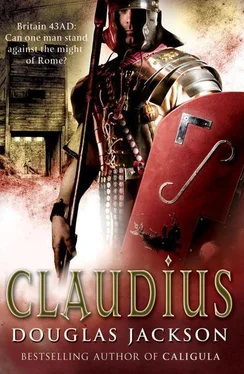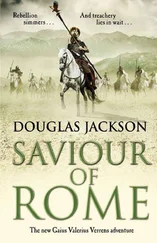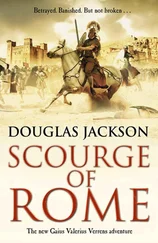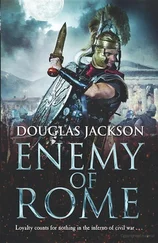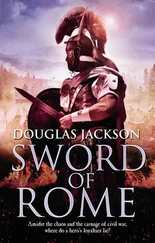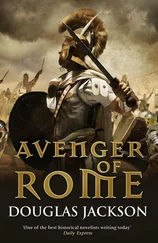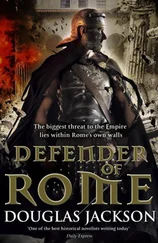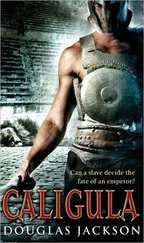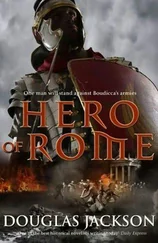Douglas Jackson - Claudius
Здесь есть возможность читать онлайн «Douglas Jackson - Claudius» весь текст электронной книги совершенно бесплатно (целиком полную версию без сокращений). В некоторых случаях можно слушать аудио, скачать через торрент в формате fb2 и присутствует краткое содержание. Жанр: Исторические приключения, на английском языке. Описание произведения, (предисловие) а так же отзывы посетителей доступны на портале библиотеки ЛибКат.
- Название:Claudius
- Автор:
- Жанр:
- Год:неизвестен
- ISBN:нет данных
- Рейтинг книги:4 / 5. Голосов: 1
-
Избранное:Добавить в избранное
- Отзывы:
-
Ваша оценка:
- 80
- 1
- 2
- 3
- 4
- 5
Claudius: краткое содержание, описание и аннотация
Предлагаем к чтению аннотацию, описание, краткое содержание или предисловие (зависит от того, что написал сам автор книги «Claudius»). Если вы не нашли необходимую информацию о книге — напишите в комментариях, мы постараемся отыскать её.
Claudius — читать онлайн бесплатно полную книгу (весь текст) целиком
Ниже представлен текст книги, разбитый по страницам. Система сохранения места последней прочитанной страницы, позволяет с удобством читать онлайн бесплатно книгу «Claudius», без необходимости каждый раз заново искать на чём Вы остановились. Поставьте закладку, и сможете в любой момент перейти на страницу, на которой закончили чтение.
Интервал:
Закладка:
‘The whole army was on the verge of mutiny. The men of the Ninth were at the heart of it; they said they refused to leave the known world. The known world!’ Narcissus spluttered. ‘We have traded with the tribes of Britain for a hundred years. The sailors of the invasion fleet know the waters of the south coast better than they know their own. The Ninth have been headquartered in Pannonia for so long they have put down roots. A legion should be moved every ten years if it is not to become part of what it has conquered. They did not want to leave their cosy barracks and their pretty mistresses. They thought if they could hold out for long enough Plautius would give in and send them home and call for another legion. Emperor Claudius feared they would make him a laughing stock and he blamed me.
‘But now they will sail and, yes, the credit is mine, although it cost more than I like to remember, including my dignity.’ Narcissus shook his head ruefully. ‘The Ninth are good soldiers, but they are led by a weakling. Once they began making demands the cancer spread to disaffected elements of the other legions, the way it does if you don’t put the hot iron to it. Plautius was behind me, of course, and I exempt the Second from my tale of woe. Their commander, Flavius Vespasian, is a different animal: intelligent, a true disciplinarian and as hard as granite. He will do well, Rufus, mark my words. The usual bribes didn’t work. The rot had eaten too deep for the tribunes to remind the legions of their loyalty. In the end, I had to give them what they wanted. Land.’
He had promised Plautius’s legions that, when the conquest of Britain was complete, each veteran would receive a grant of prime land to go with his pension and scroll of thanks on his retirement.
‘They kept me waiting for two days,’ the Greek continued. ‘At the end of it, when I demanded an answer, they laughed at me, said they would be happy to take orders from a former slave, and cried, “Io Saturnalia.”’ Rufus smiled. Saturnalia was the winter festival when slaves were served by their masters, and he could imagine Narcissus’s reaction to the jibe. But the Greek was unperturbed. ‘It was I who had the last laugh. Now all they need is a favourable wind and they could be in Britain within a week.’
Rufus congratulated him, but he could read Narcissus well enough by now to know that there was more to come.
‘I promised them something else,’ he admitted. ‘They were pleased with the gift of land, but it needed just a little extra to tip the scales. I assured them their Emperor was with them in spirit and as a token of his regard he would send with them his most treasured possession.’ Rufus listened with growing unease. Narcissus was looking beyond him now and the familiar ‘harrumph’ from over his left shoulder told the young slave what was coming next. ‘His elephant.’
It was madness! Rufus had argued and pleaded. He even threatened. But Narcissus only stared at him with the puzzled expression of a father confronting a recalcitrant child. ‘Did not your Emperor create you a member of the Praetorian Guard?’ he demanded.
‘Yes, but…’ Rufus distinctly remembered the words temporary and unpaid. He had worn the dark tunic and silver breastplate on the day Bersheba pulled the golden statue of Caligula’s sister, the goddess Drusilla, to its place on the Capitoline.
‘And was that order ever revoked?’
‘No, but…’ How could it be revoked when the man who had given it was long dead?
‘Then you are subject to military authority, as Bersheba is subject to the Emperor’s authority. Deny that authority at your peril.’
‘I cannot go,’ Rufus insisted.
‘Will you disobey your Emperor?’ Narcissus demanded in astonishment.
‘What about Gaius? Who will look after him while I am at war?’
‘Ah,’ the Greek said in that perplexed way of one who had just remembered something terribly important he should never have forgotten in the first place. ‘Arrangements will be made. Your son shall accompany the invasion.’
Now Rufus’s hand stole to the lion’s tooth charm he wore at his throat as he looked down at the sleeping three-year-old. Gaius had weathered the sea voyage better than his father, along with Bersheba, who, standing four-square on her bridge pile legs in the cramped hold, had proved the most natural sailor of them all. The little boy’s face was set in a tight-eyed frown, but it was still possible to discern the fine-boned features that had made his mother such a beauty. Rufus felt the pain of guilt like a half-healed knife wound when he thought of his wife. Livia had been the lead acrobat in a troupe of dwarf entertainers and Caligula had conducted the wedding ceremony as an entertainment to amuse his guests. Their relationship had been short and tempestuous and ended on the day Gaius was born. Had he truly loved her? He couldn’t hide from the answer. Not enough.
Reluctantly, Rufus shook his son awake and Gaius moaned peevishly until Britte spooned cold porridge into his gaping mouth as if she was feeding an orphaned jackdaw. Around them was a buzz of what at first appeared chaotic activity as thousands of men were nudged and kicked awake by their officers, accompanied by the familiar dawn chorus of coughs, farts and muttered complaints.
The legionaries were bivouacked in eight-man sections. As they gathered in their ranks, ten of those sections combined to make a century, which then formed on those already in position, six centuries creating the 480-man cohort which was the basic fighting unit of the Roman army. Each legion consisted of ten cohorts plus a cavalry troop 120 strong. Decurions pushed and bullied the individual soldiers into position, while the centurions, identifiable by their distinctive cross-plumed helmets, struck out with their gnarled vine sticks and shouted themselves hoarse until the disorganized mass became a tight-knit formation in marching order and ready to do battle. Watching the Second Augusta assemble, Rufus was struck by the difference between these men and the polished Praetorian Guards he had known in the palace. Their arms and armour were well used and equally well cared for, but the real difference was in the men of the Second themselves. They had a hawk-like confidence that set them apart. Where the Praetorians were well fed and softened by years of barrack life, these were creatures of the wild. To a man they were lean and wiry, unburdened by an ounce of spare flesh, and their faces were burned nut brown and the texture of old leather from constant exposure to the elements. They toted the crippling load of their personal equipment on five-foot poles over their left shoulders. In their right hands they carried the pila, the two throwing spears they would use to slow a charging enemy. They called themselves Marius’s Mule, after the old general Gaius Marius, father of the modern legion and the man responsible for the sixty-pound burden they carried. But it was said with pride. They were hard and uncompromising. Invincible.
Rufus picked up his son and Gaius squealed as he was swung into the cart to take his place among the hay and the mealy bags from where, each day, he seemed to see the world with new eyes and greeted each experience with a fresh wonder. His cries made Britte laugh — a soft chuckle that seemed too gentle for her broad, pink-cheeked face — and her dark eyes twinkled with innocent pleasure. Like Rufus she had been taken as a slave while still a child, in a punitive raid on one of the tribes of central Gaul. She was as tall as most men and almost as broad in the chest as Bersheba. Rounded was the best word Rufus could think of to describe her. Round breasts, a round belly and a round backside that quivered when she laughed. While Britte took her place at the bullock’s side, Rufus climbed on to Bersheba’s shoulders and a few minutes later they were on the move. From his perch high on the elephant’s back, he had an elevated view of the surrounding countryside as the column snaked its way across the grasslands and trackways of southern Britain. The land, bathed by a summer sun much gentler than the one which turned Rome into an oven at this season, was a carpet of greens so vivid and varied that he could never have described them all. Dark green water meadows shot with the white of wild flowers, emerald-green stands of young beech trees, shadowy green clearings, bright greens and dusty greens, greens that shone like silver and greens that were almost brown. He was no farmer, but such lushness told its own story. This was a rich land. A land that would support anyone prepared to turn the earth, work hard and defend what they grew. Italia, with all its abundance, was a desert by comparison.
Читать дальшеИнтервал:
Закладка:
Похожие книги на «Claudius»
Представляем Вашему вниманию похожие книги на «Claudius» списком для выбора. Мы отобрали схожую по названию и смыслу литературу в надежде предоставить читателям больше вариантов отыскать новые, интересные, ещё непрочитанные произведения.
Обсуждение, отзывы о книге «Claudius» и просто собственные мнения читателей. Оставьте ваши комментарии, напишите, что Вы думаете о произведении, его смысле или главных героях. Укажите что конкретно понравилось, а что нет, и почему Вы так считаете.
